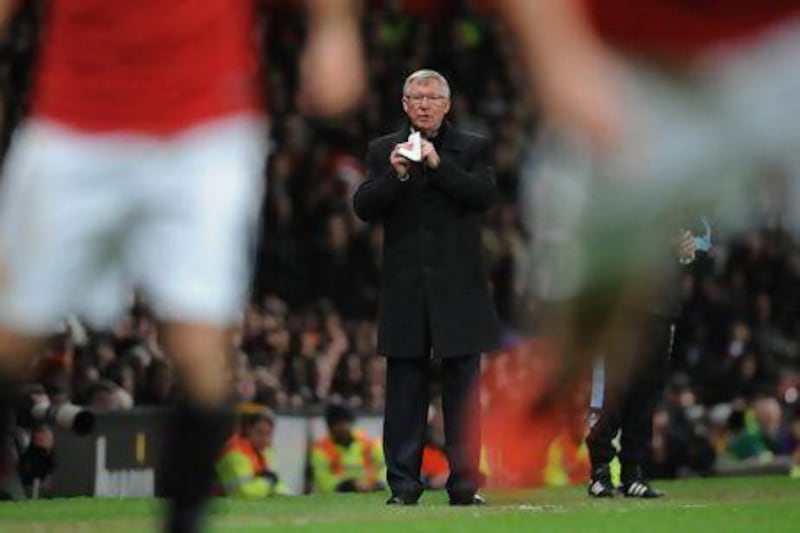Eras end. It is what they do. Nothing lasts forever. Except, it seemed, Sir Alex Ferguson's reign at Old Trafford, which began when Nelson Mandela was in prison, Ronald Reagan in the White House and Southampton, Watford and Ipswich Town had finished in the top two of the old Division One more recently than had Manchester United.
It was another world. Then, they were England's great underachievers.
Now they can fairly claim to be the world's most popular football club. That is one of Ferguson's achievements after the announcement that, both finally and yet before many anticipated, he is to retire.
There was the sense that he could continue indefinitely, furiously chewing gum on the touchline and churning out title win after title win.
Until, abruptly, Ferguson conceded defeat in his battle against time. It was a rare fight he could not win. He has the energy and drive of a man many years his younger, but the reality is that he is 71 and needs hip-replacement surgery.
But he goes out in almost unique fashion: on a genuine high. See Ferguson's United career in pictures.
Perhaps only Bob Paisley, the sole British manager to have won the European Cup more often, was able to depart in comparable circumstances. When he resigned in 1983, Liverpool's dominance was entrenched.
As Ferguson takes his leave, in 2013, it is with a subtle and significant difference. A challenge to his authority arrived as Manchester City were propelled into contention. Twelve months ago, they won the title.
Arguably, the greatest manager in football history was not about to bow out with the second-best team in Greater Manchester. It would have been out of character for a serial winner.
Yet Ferguson had ignored two other ideal opportunities to walk away. United's Uefa Champions League win in 2008 marked a remarkable renaissance after the terrible autumn of 2005, when many assumed his powers were in terminal decline.
Their 19th league title, secured in 2011, was proof that he had knocked Liverpool off their perch, in both the league table and the history books. On each occasion, he carried on. The reins of power were not surrendered. Ferguson's will to win remained as great as ever.
Now, finally, one era reaches its end point, prompting the question if another will do likewise. Without Ferguson, United are not the same force.
He, not Robin van Persie, may have been the MVP in their title-winning campaign.
And yet, the situation has changed and not merely because Ferguson's first team featured Clayton Blackmore, Graeme Hogg and Mike Duxbury and his last could include Van Persie, Wayne Wayne Rooney and Nemanja Vidic.
See a timeline of Sir Alex Ferguson's career.
The context has changed. At every step, Ferguson has kept United competitive, while positioning them on the right side of the economic divide.
As the gap between the haves and have-nots has grown, United have been among the rich. As the Champions League has assumed an ever-greater importance, they have been ever presents.
Even with £550 million (Dh3.1 billion) drained from the club because of loan and interest fees from the Glazers's takeover, success has been sustained.
The result is that he bequeaths a financial and footballing superpower.
Inevitable as comparisons are with the end of Sir Matt Busby's reign, the reality is that Ferguson's successors will not pilot the club to mid-table, let alone relegation. History will not repeat itself.
In the short term, however, it offers encouragement to Chelsea and City in next season's title race. Their meetings this season suggested little separates their strongest sides.
Instead, Ferguson has used a deep squad adeptly and United have consistently seen off the lesser lights.
The Scot has long been conscious of his responsibilities to his successor and has left numerous young players; indeed, he has spent much of his final season singing their praises. Some, such as Jonny Evans, Tom Cleverley and Danny Welbeck, have not fully justified the eulogies.
The next manager inherits a squad whose age profile is ideal but who could benefit from at least one more world-class player, especially in midfield.
He also has the inherent problem of not being Ferguson. The Scot's phenomenal record gave him a defence against everything.
Strange selections or signings that surprised everyone brooked fewer critical comments than similar moves made by his rivals.
Those who had doubted Ferguson before were often proved wrong. His successor may not get the benefit of the doubt.
Fans have been granted consistency of thought: they could believe in Ferguson.
Players enjoyed unusual continuity: they knew he would be there. Now it changes. So might their careers.
Paul Scholes will surely follow his mentor into retirement. Rio Ferdinand, whose contract expires in the summer, may have to wait to discover his future.
Most intriguingly, there is Rooney. Perhaps it matters not, now, that Ferguson dropped him against Real Madrid back in March in the second leg of their Champions League last-16 game.
Maybe the next appointment will be adamant he stays. Possibly, he will want a statement signing of his own.
Either way, the certainties of an era of almost unparalleled success are over. Manchester United are guaranteed to be a force and that is Ferguson's legacy.
But the reality is that there is not another Ferguson around. No one else has ever had a winning habit quite like his.
[ sports@thenational.ae ]






